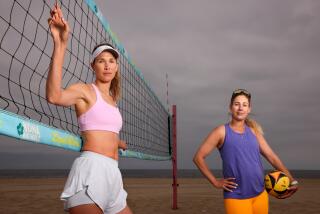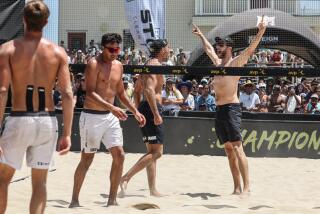Volleyball Deal May Spike Interest
- Share via
Agent Leonard Armato is close to buying two competing beach volleyball tours and merging them into one, marking the latest effort to reverse the sport’s fortunes.
Armato, who represents Laker center Shaquille O’Neal, would unify the Assn. of Volleyball Professionals and the newer Beach Volleyball America, which have been at odds in the last year.
Armato, who has long had an interest in beach volleyball, is chief executive of the company making the purchase, Digital Media Campus, an incubator for sports and entertainment properties.
Armato, a former beach player in the mid-1970s and one of the founders of the AVP in 1983, declined comment Wednesday.
AVP and BVA officials confirmed the sale, pending due diligence by Digital Media Campus.
Charlie Jackson, chief executive officer of BVA, said he approached Armato for sponsorship opportunities last month, but the talks turned from investment to acquisition. It is believed that BVA will receive about $200,000 from the El Segundo-based company.
The venture capital firm that purchased the AVP from bankruptcy court in March 1999 will become a minority shareholder in the newly aligned tour in lieu of cash.
“I don’t think there’s ever been a better shot than this,” said Spencer Segura, a senior manager at Spencer Trask Ventures Inc. in New York. “If this doesn’t work, I don’t know who will ever want to try it.”
The newly formed tour will probably keep the AVP’s name, a source said, and will try to reverse a negative financial trend of several years. The AVP reached the top of its popularity curve in the mid-1990s, but questionable management and extremely high payouts for players led to fiscal straits.
Many issues need to be addressed, beginning with the competitive and somewhat hostile relationship between the AVP and BVA. The BVA tour made its debut last year as a women’s circuit--Armato’s girlfriend, two-time Olympian Holly McPeak, is among the world’s best players--and planned to add a men’s division this year, competing directly with the men-only AVP and adding tension.
The on-court rules are also markedly different. Unlike the AVP, BVA employs international rules, using a smaller court, a heavier ball and rally-scored games. The BVA tour calls itself a training ground for Olympic hopefuls, while the AVP champions itself as an original of sorts, playing in front of laid-back, tanned crowds for little more than prize money and bragging rights.
Players are confused about the meaning of the merger.
“It’s definitely a little helter-skelter,” said Dain Blanton, who won the gold medal with Eric Fonoimoana at the Sydney Olympics. “I would think [Armato] is going to stick with the international rules, simplify it and stay with one game. It could be the greatest thing, but it’s a guessing game right now. I guess they can’t say much yet because the deal’s not done.”
Armato must also find a way to renew interest in the sport itself, which has waned after a series of highly criticized moves by the AVP, including past attempts to charge exorbitant amounts for tickets and several disputes with players in recent years over Olympic qualifying.
The AVP awarded nearly $4 million annually in the free-wheeling days of the mid-1990s, but debt rose to nearly $3 million. Players were getting stiffed on their payouts. Corporate sponsors bailed, a bad sign for a sport that generates most of its revenue from sponsors and advertisers. Admission is free at most AVP events.
Neither the AVP nor BVA has a television deal with a major network. NBC ended an eight-year deal with the AVP after the 1997 season, citing decreased viewership.
Change, on the whole, is welcomed.
“I’m optimistic,” Blanton said. “I think [Armato] will be able to do some positive things if he takes over. He has the connections and he’s been involved with the sport before. Maybe five months from now, we’re involved with the best thing we’ve had in five years.”
More to Read
Go beyond the scoreboard
Get the latest on L.A.'s teams in the daily Sports Report newsletter.
You may occasionally receive promotional content from the Los Angeles Times.











